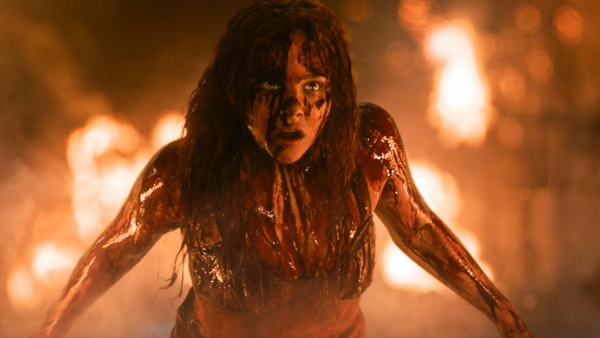Movie review by Greg Carlson
A disappointing and unnecessary remake of Stephen King’s first major success, Kimberly Peirce’s take on “Carrie” almost slavishly follows the rhythm and pace of Brian De Palma’s 1976 classic. The rehashed script, credited to Roberto Aguirre-Sacasa and original screenwriter Lawrence D. Cohen, fails to turn up anything new and significant from the source material despite filmmaker claims to the contrary. Indiewire’s Drew Taylor has suggested that the late addition of Cohen’s name to the official credit list is a legal development born of Aguirre-Sacasa’s sometimes word-for-word and scene-for-scene reliance on Cohen’s adaptation.
King’s conceptual tour de force continues to hold a magnetic appeal for audiences of many ages. Drawing on the primal fears that accompany the physical and emotional changes of adolescence and placing them in close quarters with the tension between religious fanaticism and the strong pull of normalcy and conformity, King tapped into the insecurities that go hand in hand with rites of passage. The greatest fright of “Carrie” arises from the inversion of the Cinderella story: an unthinkable scenario in which a mother seeks to murder her own flesh and blood. Peirce boldly affixes a messy, opening flashback to Carrie’s birth that flirts with infanticide by scissors, but the prologue detracts somewhat from the punch of De Palma’s charged shower room spectacle and its mix of eroticism and revulsion associated with Carrie’s menstruation.
Like some of the self-referential elements of the 2002 TV movie version of “Carrie,” the new edition slips in a few convenient updates, including an underdeveloped cyberbullying thread surrounding a YouTube upload of Carrie’s humiliation. Less competently, a throwaway reference to Tim Tebow will date faster than William Katt’s ruffled, powder blue tuxedo shirt. Surprisingly, very little attention is paid to the discovery of Carrie’s telekinetic super-powers, a thematic component ripe for reconsideration in the context of titles like “X-Men: First Class.” Aguirre-Sacasa’s experience as a Marvel Comics writer makes the missed opportunity especially vexing.
Peirce, whose blistering “Boys Don’t Cry” explored a world filled with inexplicable horror, seems like a strong choice to tackle “Carrie,” but the raw verisimilitude of her 1999 feature debut is conspicuously absent in the new movie. The director struggles with tone, especially when it comes to the handling of the high schoolers who make Carrie’s life hell. Peirce does clarify Sue Snell’s (Gabriella Wilde) sense of regret and guilt, restoring both the character’s pregnancy and her “psychic connection” to Carrie that manifests most directly in the climactic house destruction scene. The rest of the tormentors, especially Portia Doubleday’s exceedingly cruel, one-note Chris Hargensen, dart toward parody and cartoon.
While there is nothing wrong with the casting of talented performers like Chloe Grace Moretz (in her first leading role) and Julianne Moore, Peirce provides few opportunities for the principal actors to distance and distinguish themselves from Sissy Spacek and Piper Laurie. Spacek and Laurie both earned Oscar nominations for their portrayals in the De Palma film, and that feat most certainly will not be repeated by Moretz and Moore. Peirce works hard on the development and clarification of the twisted, abusive, and operatic mother-daughter dynamics, but Moretz never quite accesses the fragile vulnerability of Carrie with the same degree of credibility demonstrated by the unforgettable Spacek.
